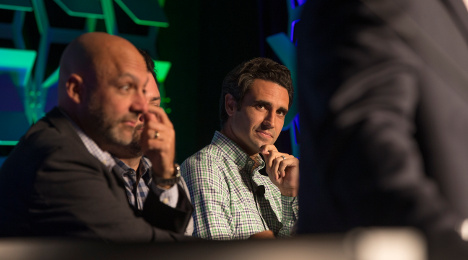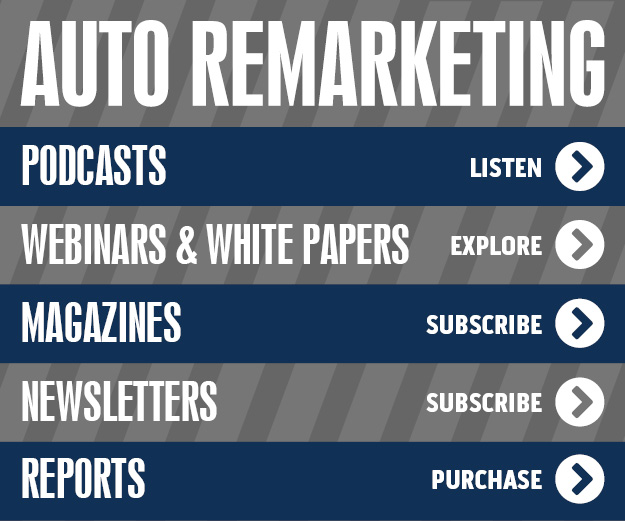Carvana IPO seen as ‘exciting’ for used industry

Carvana CEO Ernie Garcia, seen in the middle of this image from a panel discussion during last year's Used Car Week in Las Vegas, is leading the company through a $100 million IPO announced on Friday. (Photo by Jonathan Fredin)
Kelley Blue Book senior analyst Alec Gutierrez shared an enthusiastic yet cautious assessment of the $100 million initial public offering launched by Carvana, the online used-vehicle retailer that said in its filing paperwork that it has sold and delivered approximately 27,500 vehicles to customers through its website during a three-year span from its inception through the close of 2016.
“From my perspective, I think it’s certainly exciting to see another player out there, especially someone like Carvana that has such a comprehensive online digital retailing platform that’s willing to ship vehicles and all that. It is exciting to see another retailer give it a go with an IPO and get such momentum and publicity,” Gutierrez said during a conference call with the media on Monday.
“It’s another thing to be successful, whether it’s Carvana or anyone that is looking to sell used cars online,” he continued.
Gutierrez didn’t mention it specifically, but Carvana acknowledged in its IPO filing with the Securities and Exchange Commission posted this past Friday that the company has sustained some significant losses. Carvana highlighted that while revenue grew 180 percent year-over-year by the close of 2016, the company still is experiencing heavy losses as the SEC filing indicated the 2016 net loss came in at $93.1 million.
During the three-year span from January 2013 through the end of 2016, Carvana said in the filing that generated $541.8 million in revenue. However, during that span, the total losses were $152.6 million.
Gutierrez noted a potential advantage traditional brick-and-mortar dealerships currently have when retailing used vehicles over online companies such as Carvana that are looking to turn used metal with scale.
“You really have to get both parties comfortable with the condition of the vehicle and get processes in place to allow for test drives and for folks to change their minds because you know it’s going to happen,” Gutierrez said.
“Every used car is unique,” he continued. “Pictures go a long way, but once you’re sitting in the driver’s seat and get out for a test drive and you hear all of those squeaks and rattles for yourself and really try the vehicle out for yourself, you’ve got to have policies in place to get out of that car.”
“I don’t know if Carvana has it all figured out right now,” Gutierrez went on to say.
According to the answers of frequently asked questions available on Carvana’s website, the company offers a seven-day test-own period, “insuring that you are completely satisfied with your purchase.” Carvana even suggested that buyers have professional mechanics inspect the vehicle to quell any concerns about its quality and condition.
And if the customer chooses to unwind the deal, Carvana’s website said there are no restocking fees if the individual lives within 100 miles of one of its service areas. Customers from outside of that radius are responsible for fees. Furthermore, customers cannot exceed 400 miles during the seven-day test-own period; otherwise a $1 per mile charge will be accessed.
“We want our customers to be 100-percent satisfied with their purchase with us. Period,” Carvana said on its website.
Whether or not those policies are enough for Carvana to enjoy long-term success remains in question as Gutierrez added, “what you have to have figured out is how you can inspect that vehicle, recondition and get it up to high enough quality while reassuring the consumer that you’ve done an adequate enough job in taking care of that so you minimize the amount of returns through your sales process.”
While the industry waits to see how Carvana stock is acquired by investors, Gutierrez closed his assessment of the development by reiterating what he stated at the beginning of his response.
“It’s a good thing to see (Carvana) out there to try to raise some capital,” he said. “It certainly makes the environment all the more competitive and interesting.”
And some of that new competition also cheered Carvana’s move. Instamotor, a peer-to-peer car marketplace app based out of San Francisco, delivered a message to Auto Remarketing saying the company “couldn’t agree more,” in reference to the enthusiasm KBB’s Gutierrez conveyed.
“Carvana going public shows there are successful moves being made within the auto industry to make the car buying experience more convenient and reliable for consumers,” Instamotor co-founder and chief operating officer Val Gui said.
“Historically, someone looking for a new or used car had limited options, with the main one being visiting a dealership and haggling with a salesperson,” Gui continued. “Today, alternatives such as Carvana and Instamotor allow people to find their dream car for the right price, all while bypassing the traditional middleman.”
Auto Remarketing previously connected with Gui to discuss its growth plans in a report available here.

 View The Latest Edition
View The Latest Edition

